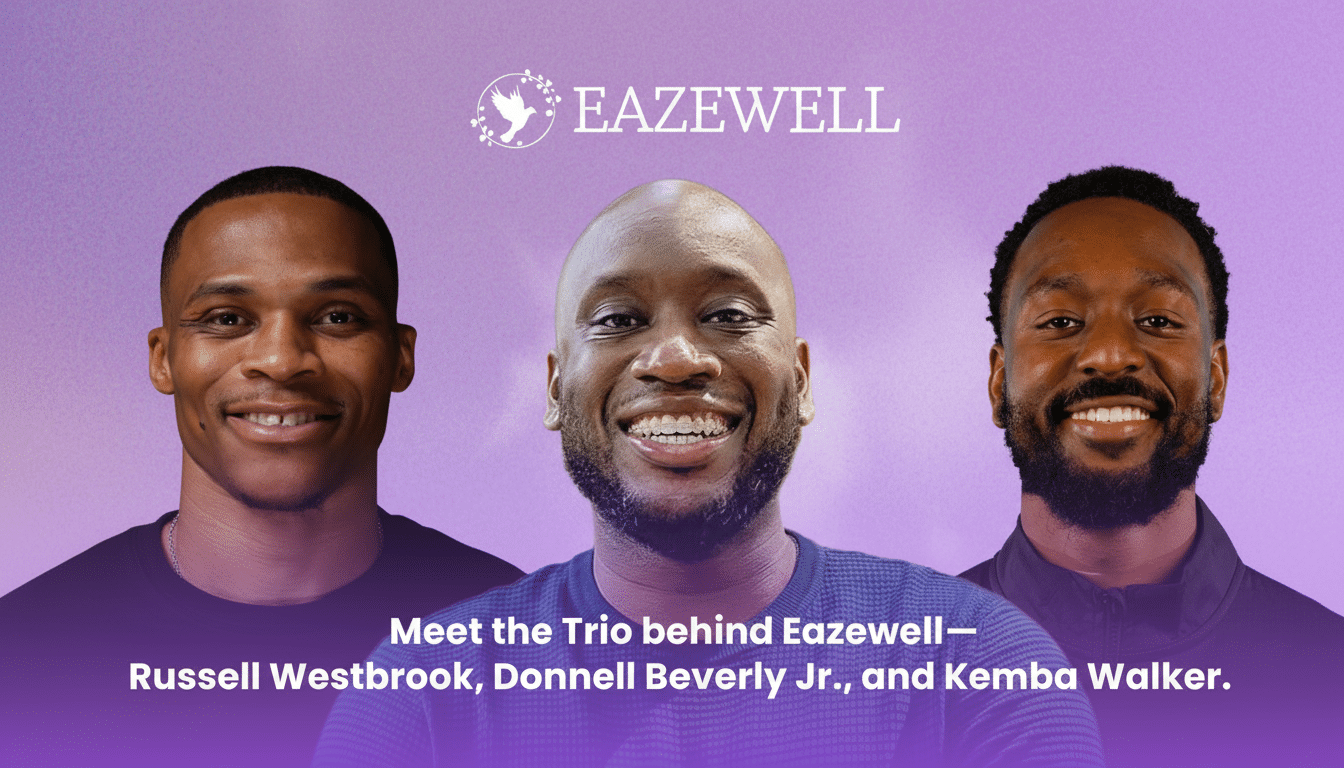An NBA All-Star focusing on one of life’s most difficult experiences may seem surprising. But that’s precisely what Russell Westbrook has worked to evolve as he teams alongside longtime friend Donnell Beverly Jr. and former All-Star Kemba Walker. Their startup, Eazewell is looking to strip away the administrative mess from end-of-life planning with an AI-driven assistant, enterprise integrations and a business model that’s aimed at expanding access to help for families that need it the most.
What Eazewell Offers Families Managing End-of-Life Tasks
Eazewell is pitched as your 24/7 guide through tasks that tend to accrue in the wake of a death: figuring out which funeral home you want and booking it, making arrangements for services, ordering death certificates, closing credit and utility accounts; pulling together information needed for probate or insurance claims. The product is built around an AI agent that triages questions, automates rote outreach and surfaces next steps so families can concentrate on people over paperwork.

The firm says its platform, which was introduced in 2024, has helped more than 100,000 families. Outside partnerships with hospice providers, funeral homes and insurers help them keep the consumer product free, aside from optional premium features for extra concierge support or specialized documentation.
Enterprise Partnerships and Revenue Model
Complementing the consumer assistant, Eazewell is developing an enterprise layer that integrates its automation into software used by hospice agencies, senior living operators and life insurers. The idea is a B2B2C distribution channel: be where families are already, inside the systems they’re already navigating, and lower the friction of starting from scratch when you hit that crisis moment.
It generates revenue through a combination of enterprise contracts, referral economics with vetted service providers and consumer upgrades. And because medical, financial and identity data are involved, with a lot of it being sensitive information, the company does compliance and data security as a core part rather than an add-on or nice-to-have: essential given the company’s focus on healthcare-adjacent partners.
Why Athletes Are Getting Behind Deathcare Tech
Beverly Jr. created Eazewell after the death of his parents a short time apart led to frustration with a web of disjointed services and data. Westbrook’s participation also is more than just a celebrity endorsement: He and Walker bring distribution muscle and community roots that can engender trust with families who are often wary of financial and funeral establishments — especially in underserved, under-resourced neighborhoods.
That trust deficit is no mere trifle. Polls from the Gallup organization indicate that fewer than half of all American adults have a will, and estate planning falls even farther behind in lower-income households and communities of color. By combining culturally competent outreach with concrete, no-cost inroads, Eazewell is betting it can expand access to end-of-life planning long before a hospital discharge or a sudden loss.

An inflection in the market for end-of-life planning and care
End-of-life is a huge, fragmented industry. The median cost of a funeral, as tracked by the National Funeral Directors Association, is in the thousands of dollars, and a burial commonly costs close to five figures when you account for a vault. Cremation rates in the U.S. are now higher than those for burials, partly due to changing preferences and concerns about cost. The Centers for Disease Control and Prevention, meanwhile, tracks more than 3 million deaths per year in the United States; the National Hospice and Palliative Care Organization estimates that hospice cares for hundreds of thousands of Medicare beneficiaries a year.
On the tech side, Eazewell enters a crowded space: Its competitors include Empathy, Cake and Everplans and, in the U.K., Farewill. Distribution and depth, in fact, are the axes along which most end-of-life businesses differentiate themselves: How deeply can a platform integrate with hospitals, hospice teams, insurers and probate workflows? How well can it automate high-friction tasks without losing empathy or compromising privacy? Eazewell is a business play that hopes to directly address those questions with embedded access rather than standalone apps.
The future of digital legacies and managing online assets
And as more of life goes online, so does more of death. Password managers and cybersecurity firms have calculated that the average person has dozens to more than 100 online accounts. Deleting or transferring such digital assets — photos, cloud drives, social posts, subscriptions, crypto wallets — now demands an understanding of technical contours and permissions and a careful touch for the verification of identity.
Eazewell says it intends to provide additional tools for digital estate management as states follow the model of adopting the Revised Uniform Fiduciary Access to Digital Assets Act, in compliance with platform policies such as Apple’s Legacy Contact and Google’s Inactive Account Manager. Done right, that means fewer abandoned accounts, smoother flows of value and memories — and less administrative trauma for families who are already grieving.
The opportunity — and the responsibility — is significant. Probate usually extends over six to 12 months, costs mount rapidly and small errors have ripple effects. Success in achieving it (as with Juice WRLD) depends on navigating a morass of shortcuts and detritus, not just in the music itself but in the media economy from which popular music often sprouts; if Eazewell can combine supple automation with human guidance and local-trusted voices, Westbrook’s most recent handoff could land where it tends to be most needed: at the solid ground between dignity, clarity and time.

